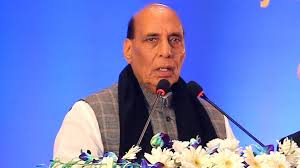NEW DELHI: Defence Minister Rajnath Singh on Thursday termed drones and space capabilities as the game changers in the field of warfare. He said this while addressing the Armed Forces officers of India and friendly foreign countries during the convocation ceremony of the 80th Staff Course of Defence Services Staff College (DSSC), Wellington, Tamil Nadu.
The Defence Minister said that the world was in the age of ‘Grey zone and hybrid warfare’ where cyber-attacks, disinformation campaigns and economic warfare have become tools to achieve politico-military aims without a single shot being fired.
“India faces persistent threats along its borders, which are further compounded by the challenge of proxy war and terrorism emanating from its neighbourhood,” he added.
Singh termed the power of technological innovation in combat theatres as breath-taking. “In the Ukraine-Russia conflict, drones have virtually emerged as a new arm, if not a transformative science,” he said.
A majority of losses of soldiers and equipment have been attributed neither to traditional artillery nor to armour, but to drones, said the minister.
He added that space capacities were transforming military intelligence, persistent surveillance, positioning, targeting and communications.
PM Narendra Modi-led government is leaving no stone unturned to transform the armed forces into a technologically-advanced combat-ready force capable of multi-domain integrated operations, said Singh.
The minister said artificial intelligence (AI) and other emerging technologies were revolutionising deterrence and war-fighting in critical ways. The armed forces must operate jointly and remain future-ready in today’s ever-evolving multi-domain environment, where cyber, space and information warfare are as potent as conventional operations, the Defence Minister asserted.
The minister said global geopolitics was being redefined by three key metrics — including a technological tsunami. He urged officers to study the nuances of new trends to stay ahead on strategic-military change curve.
Singh also spoke about the impact of the conflict in West Asia and the geopolitical tensions in the Indo-Pacific, besides non-traditional security threats such as natural disasters and climate change. He stressed on the need to vigorously pursue the transformation of the armed forces to remain capable and relevant for future wars.


